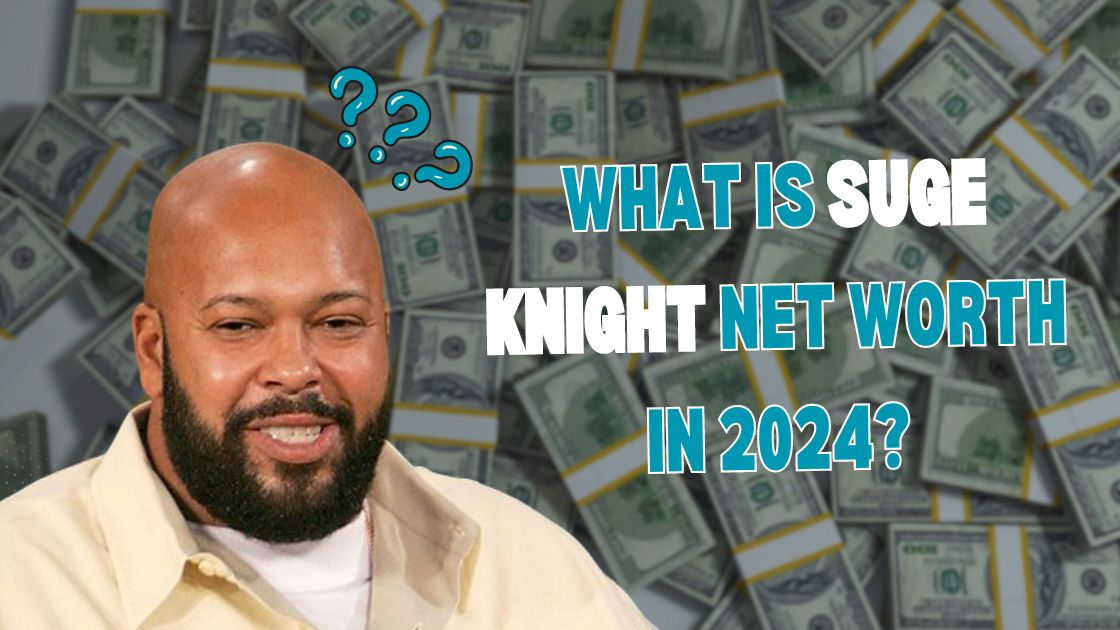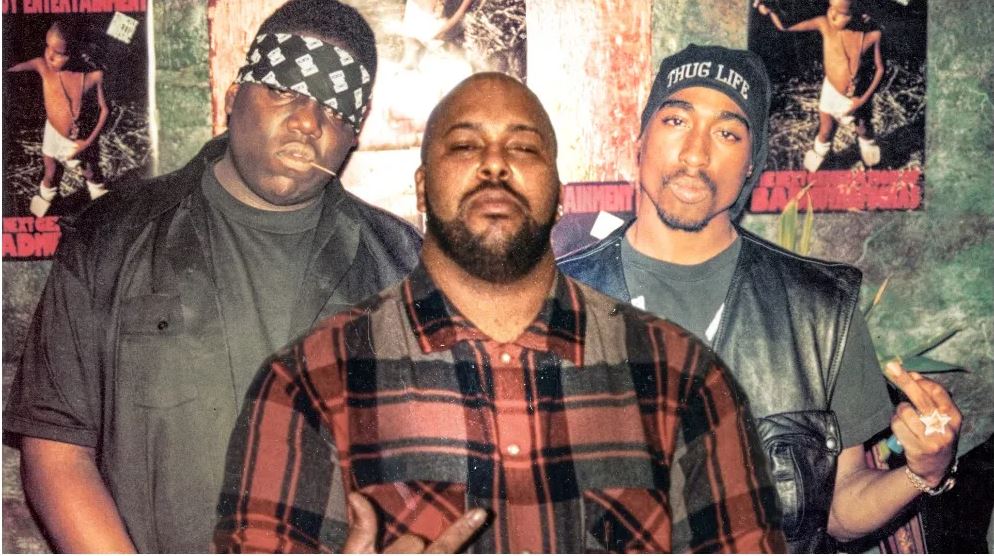Suge Knight net worth is 200 Thousand, is a mighty figure in hip-hop and music in general. Suge Knight, a controversial man who once held the head position at Death Row Records, has significantly fluctuated his net worth. An important player in rap during the 1990s, his monetary achievement was straightforwardly connected to the accomplishments of amazing specialists like Tupac Shakur, In the level of his vocation pay, his total assets were in the thousands and were helped by the record-breaking collection deals and worthwhile business arrangements. His financial situation is shattered by litigation, jailing and the loss of money in various lawsuits. In light of late assessments, Suge Knight’s total assets have been in decline, which is an impression of the convoluted blend of his very capable achievements and individual battles.
| Real Name | Marion Hugh Knight Jr |
| Nick Name | Suge Knight |
| Date of birth | April 19, 1965 |
| Birthplace | Lynwood |
| Nationality | United States of America |
| Gender | Male |
| Height | 1.88 M |
| Weight | 120.2 Kg |
| Eye Color | Brown |
| Hair Color | Black |
| Parents Name | Marion Huge Sr & Maxine |
| School | Lynnwood High School |
| College | University of Nevada |
| Religion | Christian |
| Zodiac SignAries | Aries |
| Marital Status | Divorced |
| Net Worth 2024 | 200 Thousand |
| Last Updated | 2024 |
What is Suge Knight Net Worth in 2024?

Starting around 2024, Suge Knight net worth 200 Thousand. The previous music investor and prime supporter of Death Row Records, has expected total assets that have ignited significant premiums. Notwithstanding his last outcome in the music business, Knight’s monetary status has been essentially affected by fights in court and imprisonment. Marion Hugh “Suge” Knight Jr. significantly affected the music world during the 1990s, especially in the hip-jump scene. His record mark, Death Row Records, was instrumental in the professions of amazing specialists like Dr. Dre, Tupac Shakur, and Sneak Homey. At the pinnacle of his profession, Knight’s total assets were accounted for in large numbers.
Nonetheless, Knight’s fortunes slumped due to various lawful issues. In 2018, he was condemned to 28 years in jail following a request bargain over a deadly quick in-and-out episode. This legitimate strife has impacted his monetary status, with reports recommending that his resources have been exhausted throughout the years because of lawful expenses and fumble.
Suge Knight’s Net Worth Over the Past Year
Suge Knight, a name inseparable from the ascent of gangsta rap and the outcome of Death Row Records, has seen his total assets vacillate fundamentally throughout the long term. Starting not long ago, Knight’s monetary circumstances have kept mirroring the outcomes of his legitimate difficulties and detainment. ThereSuge Knight’s total assets in the previous year have remained the same. His total assets have been generally static, remaining imprisoned with restricted means to participate in undertakings. Starting around 2024, it is assessed to be around $200,000, a distinct difference from the large numbers he directed at the level of his vocation.
| Suge Knight Net Worth 2024 | 200 Thousand |
| Suge Knight Net Worth 2023 | 150 Thousand |
| Suge Knight Net Worth 2022 | 100 Thousand |
| Suge Knight Net Worth 2021 | 80 Thousand |
The continuous expenses related to lawful charges and the absence of new revenue sources have kept his total assets low. His resources are considered negligible, as much of his abundance was either spent on lawful guards or lost to repayments and different obligations. Knight’s circumstance shows how rapidly fortunes can change, especially in an unstable media outlet where legitimate and private matters can modify one’s monetary scene.
Early Life and Career Beginnings

Marion Hugh “Suge” Knight Jr. was brought into the world on April 19, 1965, in Compton, California, a city known for its lively music scene and testing financial circumstances. The epithet “Suge,” another way to say “Sugar Bear,” was warmly given to him by his folks. Knight’s athletic ability was apparent immediately; he succeeded in football during his secondary school years, a long time at Lynwood Secondary School and later, at El Camino School. His abilities on the field procured him a grant to the College of Nevada, Las Vegas, where he played university football. In any case, he didn’t seek after sports expertly; all things considered, his inclinations moved towards the music business. After school, Knight filled in as a protector for big names before wandering into music distributing. His large break came when he established Death Row Records in 1991 with Dr. Dre, who had recently withdrawn from N.W.A. The name immediately became a force to be reckoned with, reforming the rap kind by delivering hits for artisans like Dr. Dre, Sneak Homeboy, and Tupac Shakur. Knight’s initial vocation was set apart by his forceful business strategies and capacity to arrange bargains that inclined toward his specialists, making way for his later conspicuousness in the business. This short record features the primary long stretches of Suge Knight’s life, catching his change from sports to music head honcho.
How did Suge Knight Get Rich?
Suge Knight’s excursion to abundance is a story of desire, smartness, and debate inside the vicious music industry. He amassed his fortune basically through the foundation of Death Row Records in 1991. Perceiving the dangerous capability of gangsta rap, Knight profited from this sort’s rising ubiquity by marking the absolute most notorious specialists of the time, including Dr. Dre, Sneak Homey, and Tupac Shakur. His system was established in making a name that specialists found engaging because of its commitment to higher eminences and more artistic liberty contrasted with different marks. The arrival of Dr. Dre’s notable collection “The Persistent” in 1992, trailed by Sneak Home slice’s presentation collection “Doggystyle,” moved Death Row Records into an extravagant substance practically short-term. These collections sold many duplicates each and molded the course of hip-bounce music, carrying critical monetary accomplishments to Knight. His abundance further developed as the mark ruled the graphs through the mid-90s, profiting from high collection deals, rewarding dissemination bargains, and fruitful promoting. Notwithstanding his later monetary and legitimate difficulties, this underlying time of extraordinary accomplishment with Death Row Records laid out Suge Knight’s standing and abundance in the music business.
How Did Suge Knight Make Money?
Suge Knight, a previous music leader, brought in his cash through the music business as a fellow benefactor and Chief of Death Row Records. Established in the mid-1990s, Death Row Records became a prevailing name in the hip-bounce scene, marking conspicuous artisans like Dr. Dre, Tupac Shakur, and Sneak Homeboy. The name’s notable collections, like Dr. Dre’s “The Constant” and Tupac’s “All Eyez on Me,” were colossal business triumphs, producing significant income through collection deals, sovereignties, and promoting. Furthermore, Knight’s forceful business strategies and dealings were instrumental in the monetary outcome of the name, even though his vocation was additionally set apart by lawful and financial troubles. Suge Knight’s Monetary Battles.
Suge Knight’s Financial Struggles
Suge Knight, when a transcendent player in the music business, has faced broad money-related difficulties throughout the long haul. His monetary downfall started with his fights in court and imprisonment, which restricted his capacity to oversee and produce new pay. After making top progress with Death Row Records, Knight’s fortunes started to wind down in the last part of the 1990s. His mark confronted a progression of claims and monetary debates that depleted its assets. Moreover, the flight of key craftsmen and blunders prompted declining deals and income.
By the 2000s, Knight had petitioned for financial protection, guaranteeing more than $100 million in obligations. This was a conspicuous difference from the multimillion-dollar total assets he bragged about during the pinnacle of his profession. The liquidation filings uncovered a profound monetary opening, with Knight’s resources incapable of paying for the mounting legitimate expenses and claims against him. These monetary battles have continued into late years, exacerbated by his imprisonment and failure to participate in business exercises. Starting around 2024, Knight’s total assets are assessed to be a simple part of what they used to be, mirroring the significant effect of his lawful and individual difficulties on his monetary status. This outline catches the critical components of Knight’s economic slump, highlighting the emotional shift from success to difficulty.
Suge Knight’s Source of Wealth
Music Industry Leadership: Suge Knight helped to establish Death Row Records in 1991, a name that became unmistakable by marking significant specialists like Dr. Dre, Sneak Home Slice, and Tupac Shakur. The mark’s outcome in the right from time to the mid-90s assumed an essential part in Knight’s abundance gathering.
Record Sales and Royalties: Under his authority, Death Row Records delivered multi-platinum collections, including Dr. Dre’s “The Constant,” Sneak Homey’s “Doggystyle,” and Tupac’s “All Eyez on Me.” These collections produced significant income through high-record deals and continuous sovereignties.
Artist Management and Production: Knight, with a few top specialists, delivers music, expanding his impact in the music business and helping his monetary benefits through different creations and board expenses.
Assets and Investments: In the past music creation, Suge Knight put resources into different resources, including land and other undertakings, adding to his riches, but with changing levels of accomplishment and steadiness.
Controversies and Legal Battles: It’s vital to note that while his undertakings brought him riches, lawful issues and settlements have essentially affected his monetary status throughout the long term. His contribution to different lawful questions and the related expenses have impacted his total assets.
Media and Public Appearances: Knight has brought in cash from his appearances in media and narratives examining his life and the historical backdrop of Death Row Records, adding a layer to his kinds of revenue.
Business Investments of Suge Knight

Suge Knight, once in charge of Death Row Records, wandered into different business speculations during his profession. Known for his aspiration, Knight investigated open doors in various areas. His investments included entertainment-related projects beyond music production, like dipping into film production and promoting boxing events, attempting to capitalize on his connections and the influence of his label. However, many of Knight’s business ventures faced challenges despite his early successes. The instability was compounded by his legal troubles and eventual imprisonment, drastically limiting his ability to manage these investments effectively. Over time, these ventures either stalled or failed to generate significant returns, contributing to his financial decline. This narrative showcases how Knight’s investment strategies, while ambitious, were ultimately hindered by external pressures and his turbulent personal life, reflecting a cautionary tale of potential missteps in business diversification.
Real Estate
Suge Knight diversified his financial portfolio by venturing into real estate, an industry known for its potential for high returns. His investments included purchasing and managing various properties, contributing to his wealth in several ways.
- Property Portfolio Expansion: Suge Knight diversified his wealth by investing in various real estate properties, including residential and commercial spaces.
- Strategic Locations: His investments were often in high-demand areas, which promised high returns through appreciation over time.
- Rental Income: Knight earned steady revenue from renting out properties, contributing a significant income separate from his music business.
- Asset Appreciation: Over the years, the value of his real estate holdings has been appreciated, providing him with opportunities to sell properties at a profit.
- Leveraging Equity: Knight sometimes used the equity from his real estate investments to secure loans, which he could invest back into his music ventures or other business opportunities.
These real estate investments were crucial to Knight’s financial strategy, providing immediate income through rentals and long-term wealth through appreciation.
Raise to Fame
Suge Knight’s climb started after he helped to establish Death Row Records in 1991 with Dr. Dre, who was anxious to split away from N.W.A and send off a performance vocation. The name immediately became the focal point of West Coast hip-bounce, catapulting the vocations of symbols like Dr. Dre, Sneak Homey, and Tupac Shakur. Knight’s skill for perceiving ability and impressive presence in arranging bargains were urgent in molding the mark’s prosperity. His forceful strategies earned rewarding agreements with his artisans while guaranteeing that the mark amassed significant benefits. Death Row Records ruled the outlines with collections like Dr. Dre’s “The Persistent” and Sneak Home slice’s “Doggystyle,” which became social peculiarities and set Knight’s standing as a significant industry player. His ascent was because of his business discernment and capacity to develop a brand that resounded with the ethos of hip-jump at that point, making him a compelling figure in molding the heading of music during the 1990s. This synopsis frames the pivotal advances and procedures behind Suge Knight’s quick move to noticeable quality inside the music business.
Conclusion
Suge Knight’s heritage in the music business is unquestionably powerful yet damaged by discussion. From helping to establish Death Row Records and impelling the vocations of the absolute most notable artisans in hip-bounce, Knight’s initial commitments to music were historic. Lawful issues and monetary burdens have overwhelmed his later years, eclipsing his past triumphs. At present, while carrying out an extended jail punishment, Knight’s is a useful example of the expected entanglements of media outlets. Notwithstanding his previous accomplishments, his perseverance through inheritance is confounded by his legitimate battles and the sensational decay of his own monetary prosperity. Knight’s effect on music will continuously be recollected, as will the illustrations. His biography shows the results of uncontrolled aspiration and the temporary idea of distinction and fortune in the vicious music business. This end typifies the double parts of Knight’s inheritance, featuring his critical commitments and resulting difficulties.

Jennifer David is the creative force behind CelebRiches, your go-to source for celebrity financial exploits. With an unwavering passion for the entertainment industry, she delivers in-depth insights into celebrities’ net worth, combining thorough research with a captivating narrative. Explore the stars’ fiscal journeys through Jennifer’s expert lens, where finance meets fame most engagingly.







